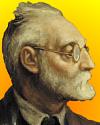 (source)
(source)
|
Miguel de Unamuno
(29 Sep 1864 - 31 Dec 1936)
Spanish novelist and philosopher whose works included essays, novels, poetry and theatrical plays. He was a modernist and an intellectual.
|
Science Quotes by Miguel de Unamuno (15 quotes)
All knowledge has an ultimate goal. Knowledge for the sake of knowledge is, say what you will, nothing but a dismal begging of the question.
— Miguel de Unamuno
Tragic Sense of Life (1913), translated by John Ernest Crawford Flitch (1954), 90.
Chemistry ought not to be for chemists alone.
— Miguel de Unamuno
From Miguel Unamuno and J. E. Crawford Flitch (trans.), Essays and Soliloquies (1926), 122.
For science, in so far as it is a substitute for religion, and reason, in so far as it is a substitute for faith, have always foundered. Science will be able to satisfy in an increasing measure, and in fact does satisfy, our increasing logical and intellectual needs, our desire to know and understand the truth; but science does not satisfy the needs of our heart and our will, our hunger for immortality—far from satisfying it, it contradicts it.
— Miguel de Unamuno
From Miguel Unamuno and J. E. Crawford Flitch (trans.), Essays and Soliloquies (1926), 209.
Great cities are levelling; they lift up the low and depress the high; they exalt mediocrity and abase superlativeness—the result of the action of the mass, as powerful in social life as in chemistry.
— Miguel de Unamuno
From Miguel Unamuno and J. E. Crawford Flitch (trans.), Essays and Soliloquies (1926), 126.
Only one who attempts the absurd is capable of achieving the impossible.
— Miguel de Unamuno
From the original Spanish, “Sólo el que ensaya lo absurdo es capaz de conquistar lo imposible,” in Vida de D. Quijote y Sancho: Según Miguel de Cervantes Saavedra: Explicada y Comentada por Miguel de Unamuno (1905), 175-176. Translated by J.E. Crawford Flitch in Miguel de Unamuno: Essays and Soliloquies (1925), 104-105. This predates the quote attributed (without a known primary source) to M.C. Escher: “Only those who attempt the absurd will achieve the impossible.”
Science is a cemetery of dead ideas, even though life may issue from them.
— Miguel de Unamuno
Tragic Sense of Life (1913), translated by John Ernest Crawford Flitch (1954), 90.
Science robs men of wisdom and usually converts them into phantom beings loaded up with facts.
— Miguel de Unamuno
In Miguel de Unamuno and John Ernest Crawford Flitch (trans.), 'Arbitrary Reflections Upon Europeanization', Essays and Soliloquies, (1925), 55.
Science says: “We must live,” and seeks the means of prolonging, increasing, facilitating and amplifying life, of making it tolerable and acceptable, wisdom says: “We must die,” and seeks how to make us die well.
— Miguel de Unamuno
'Arbitrary Reflections', Essays and Soliloquies, translated by John Ernest Crawford Flitch (1925), 154. In Robert Andrews, The Columbia Dictionary of Quotations (1993), 844:9.
Science teaches us, in effect, to submit our reason to the truth and to know and judge of things as they are—that is to say, as they themselves choose to be and not as we would have them to be.
— Miguel de Unamuno
In Tragic Sense of Life (1913), translated by John Ernest Crawford Flitch (1954), 193.
The cultivation of any science—of chemistry, of physics, of geometry, of philology—may be, though within very narrow limits and restrictions, a work of differentiated specialization; but philosophy, like poetry, is either a work of integration and harmony or else it is mere philosophism, pseudo-philosophical erudition.
— Miguel de Unamuno
From Miguel Unamuno and J. E. Crawford Flitch (trans.), Essays and Soliloquies (1926), 201.
The skeptic does not mean him who doubts, but him who investigates or researches, as opposed to him who asserts and thinks that he has found. The one is the man who studies the problem and the other is the man who gives us a formula, correct or incorrect, as the solution of it.
— Miguel de Unamuno
'My Religion', Essays and Soliloquies, translated by John Ernest Crawford Flitch (1925), 56. In Robert Andrews, The Columbia Dictionary of Quotations (1993), 844:9.
True science teaches, above all, to doubt and to be ignorant.
— Miguel de Unamuno
Tragic Sense of Life (1913), translated by John Ernest Crawford Flitch (1954), 93.
Was man made for science, or was science made for man?
— Miguel de Unamuno
Tragic Sense of Life (1913), translated by John Ernest Crawford Flitch (1954), 12.
When a thing is said to be not worth refuting you may be sure that either it is flagrantly stupid—in which case all comment is superfluous—or it is something formidable, the very crux of the problem.
— Miguel de Unamuno
In Tragic Sense of Life (1913), translated by John Ernest Crawford Flitch (1954), 99.
While men believe themselves to be seeking truth for its own sake, they are in fact seeking life in truth.
— Miguel de Unamuno
Tragic Sense of Life (1913), translated by John Ernest Crawford Flitch (1954), 23.
 In science it often happens that scientists say, 'You know that's a really good argument; my position is mistaken,' and then they would actually change their minds and you never hear that old view from them again. They really do it. It doesn't happen as often as it should, because scientists are human and change is sometimes painful. But it happens every day. I cannot recall the last time something like that happened in politics or religion.
(1987) --
In science it often happens that scientists say, 'You know that's a really good argument; my position is mistaken,' and then they would actually change their minds and you never hear that old view from them again. They really do it. It doesn't happen as often as it should, because scientists are human and change is sometimes painful. But it happens every day. I cannot recall the last time something like that happened in politics or religion.
(1987) -- 


